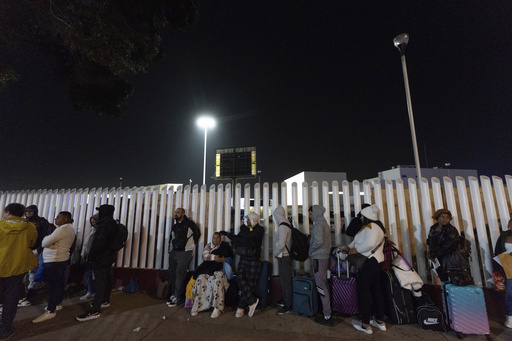SAN DIEGO — “Build the Wall” was a central theme of Donald Trump’s campaign in 2016, a promise he actively pursued by reallocating military funds to construct an extensive border wall between the United States and Mexico. In the run-up to the 2024 presidential election, “Mass Deportation” has emerged as a rallying point for his supporters.
Trump’s recent electoral win signals a potential swift response to immigration concerns, as indicated by an AP VoteCast survey revealing that his backers prioritize immigration and inflation—topics that have featured prominently in his campaign agenda. How Trump will implement his immigration policies remains uncertain.
Trump and his advisers have sketched out general plans, but many crucial details about deporting an estimated 11 million undocumented immigrants remain unanswered. Questions abound regarding how individuals would be identified, where they would be detained, what would happen if their countries refuse repatriation, and how funding and manpower for deportation efforts would be secured.
One of Trump’s proposals includes using the Alien Enemies Act, a law enacted in 1798 that allows for the deportation of noncitizens from nations the U.S. is at war with. He has also suggested deploying the National Guard, which can be dispatched by state governors. Stephen Miller, a prominent advisor to Trump, indicated that Republican governors sympathetic to the president’s agenda could send troops to states that are resistant to his policies.
With Trump’s characterization of immigrants as “poisoning the blood” of the nation, his rhetoric has fueled apprehension among immigrant communities. Julie Moreno, a U.S. citizen married to an undocumented Mexican man since 2016, is grappling with the possibility of living apart from her husband, who arrived in the U.S. in 2004. Although she considered moving to Mexico, it would severely impact her business importing boxing gloves.
“I can’t express how I feel, there are just so many emotions,” Moreno said, her voice quivering as she reflected on Trump’s election victory. “I fear for my husband’s safety… If he gets detained, what will happen to him?” Her husband, Neftali Juarez, who has contributed to the economy through his construction business and tax payments, lamented the contrasting sentiments of the voters. “It’s painful to think about losing my wife,” he shared.
Policy analysts anticipate that Trump’s initial actions regarding immigration will focus on the U.S.-Mexico border. He may exert pressure on Mexico to continue limiting migrant access to the U.S. and push for the reinstatement of policies that previously required asylum-seekers to wait in Mexico for their U.S. hearings.
Andrew Arthur, a fellow at the Center for Immigration Studies, echoed this notion, suggesting that any mass deportation would occur gradually rather than in a sweeping manner. “You can’t expect an all-encompassing dragnet,” he remarked, emphasizing the need to first secure the border before addressing internal immigration issues. “The available resources will guide these actions.”
Elena, a Nicaraguan immigrant living in the U.S. illegally for 25 years, expressed her anguish following Trump’s election. She fears deportation, and together with her husband, faces an uncertain future, especially with their two adult daughters suffering health issues linked to anxiety about the election’s outcome.
“It’s hard to think about leaving the place I’ve called home,” Elena, who resides in South Florida, said. “I’ve planted roots here, and starting over would be incredibly difficult.”
Advocates concerned about deportation practices are monitoring potential arrests and are particularly vigilant about ensuring that authorities uphold policies that historically avoid sensitive locations like schools, hospitals, and places of worship. Heidi Altman, federal advocacy director at the National Immigration Law Center’s Immigrant Justice Fund, highlighted the urgency of the situation. “We need to remain alert and aware that this is not 2016,” she cautioned. “Trump and Stephen Miller have gleaned important lessons from their previous term, and the judicial landscape has shifted significantly in the intervening years.”
As Trump prepares to reintroduce various policies from his first administration while reversing key measures implemented by Biden, several key points have emerged. He has consistently criticized Biden’s initiatives aimed at enhancing legal immigration pathways. These include a recent program that has allowed close to a million migrants to enter through land crossings since January 2023 and another that has granted entry to over 500,000 individuals from various countries with sponsorship.
Trump also reduced the number of refugees admitted to the lowest levels since the program was created, while Biden reinstated and increased those caps significantly. Furthermore, Trump sought to dismantle the Deferred Action for Childhood Arrivals (DACA) program, which protects childhood arrivals from deportation, a matter currently under legal scrutiny. For now, though, existing DACA recipients can renew their status, while new applicants are not being accepted.
The Temporary Protected Status program, which allows those from unsafe homelands to remain in the U.S., also saw substantial reductions under Trump, in stark contrast to Biden’s expansions affecting hundreds of thousands of individuals from various nations.
In New York, Maribel Hernandez, a Venezuelan woman granted TPS until April 2025, expressed her distress about the future as her young child slept nearby. “Imagine if they eliminate this protection,” she exclaimed.


